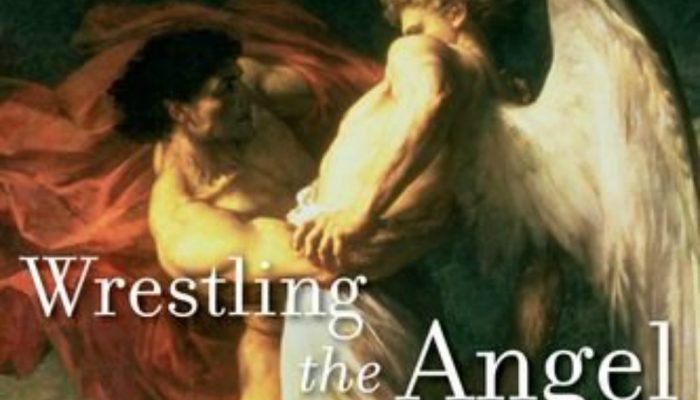
LDS.net had the privilege of interviewing Terryl and Fiona Givens in anticipation of the release of Terry’s new book, Wrestling the Angel. We appreciated their candor, insights, love of the gospel and obvious care for each other. We hope you enjoy this as much as we did.
LDS.net: With your book, Wrestling the Angel coming out, we wanted to get some thoughts from you. What inspired you to study Mormon thought as an academic pursuit, and how has that been received by non-LDS academics?
Terryl: It was total serendipity that led me into Mormon studies. I had absolutely no intentions or interest in studying Mormonism as an academic discipline until the early 1990’s when my father, who was an eclectic book collector,  bestowed upon me a series of anti-Mormon articles and novels of the mid- 19th century. And he said to me, “Hey, you’re in literature, you ought to do something with this stuff.” And I looked at these old Harper’s Magazine articles, Zane Grey novels, and Arthur Conan Doyle’s A Study in Scarlett, and I said, “You know, there’s some really interesting and intriguing patterns in the way Mormons are being represented in this popular fiction,” and that launched me into my first book, The Viper on the Hearth.
bestowed upon me a series of anti-Mormon articles and novels of the mid- 19th century. And he said to me, “Hey, you’re in literature, you ought to do something with this stuff.” And I looked at these old Harper’s Magazine articles, Zane Grey novels, and Arthur Conan Doyle’s A Study in Scarlett, and I said, “You know, there’s some really interesting and intriguing patterns in the way Mormons are being represented in this popular fiction,” and that launched me into my first book, The Viper on the Hearth.
LDS.net: And how has it been received by your non-Mormon academic peers?
Terryl: Well, it helps when you have a press like Oxford University behind your name, so that lent instant credibility and interest to what I was doing. Some greatly appreciate it, although here in the South not everybody thinks that Mormon studies is the most appropriate subject for academic inquiry.
LDS.net: Now, I’m familiar with your work. I’ve read By the Hand of Mormon, The God Who Weeps, and several papers and articles, and a recent AMA dialog and exchange. Most people would firmly place you in the apologetics camp, especially with By the Hand of Mormon. But I have trouble classifying you in that direction. Where would you classify yourself?
Terryl: I wouldn’t. You know, Martin Marty was once asked what was a cult, and he replied, “That’s easy, a cult is a church you don’t happen to like.” I find that “apologist” is a label that is similarly fraught with too much baggage. And so, I just like to think of myself as an insider/outsider who tries to examine Mormon history and theology and culture from the twin lenses of believing disciple and an academic, a scholar.
LDS.net: Would you say Richard Bushman’s in the same league or camp, or would you say he does different things than you?
Terryl: No, I’m happy to consider myself doing, engaged in the same kind of project he is.
LDS.net: OK, this one’s for both of you, this question. What kind of feedback have you received from The God Who Weeps and from what areas?
Fiona: The feedback has been extraordinarily positive. I mean, as soon as the book came out, reviews came out from actually the intellectual academic circle of Mormonism, and we were really surprised by the enthusiasm that was solicited by that book. I think we’ve only received positive feedback from that book from all quarters.
LDS.net: And tell me about any feedback from non-member quarters. What kind of people are gravitating to it, and what have they said?[quote_right]”Your book makes me wish that I were Mormon”[/quote_right]
Terryl: Well, I noticed one review from Evangelicals that said, “Your book makes me wish that I were Mormon”….Except for a couple of caveats about spiritual autonomy and independence he talked about. We also had some letters from non-members who’ve read it and have also been told by missionaries that it’s been useful in helping people to make the decision to be baptized. So I think that what we were trying to do was really write for a larger audience than just the insiders of the Church. We were trying to present what we thought…we were trying to make a presentation of the essential heart of Mormonism without starting with all the “red flag” concepts and ideas that can be a distraction from its real essence.
Fiona: We also received an email from a young missionary friend of ours serving in Moscow, and she said that the book was being circulated for the young missionaries — the missionaries who were struggling or having challenges. And so it really does seem to have had a diverse readership, who say that they have benefitted greatly from it, so that’s very heartening.
LDS.net: Yes, I loved it. In fact, I had the draft, and I read that before it published, and I thank you for sending that to me. I read through all of the exchange on your AMA where you answered several questions. During the exchange, you mentioned items that will be discussed in Wrestling the Angel. Can you first take us through what prompted you to write it, to whom it’s written, and then could you share with us some of the things that will be discussed?
Terryl: I find it strange that there is almost no narrative that has ever been written of the development and essence of Mormon belief that takes us from the beginning, from the founding, up to the present moment — either for the academic world or for the more popular audience. It would seem to me that as Mormon studies catches on in the academies and gains attraction as a sub-discipline, it’s imperative that we have a place to start talking about Mormon theology. And so the field seemed wide open, and I seized the opportunity.
So I asked Oxford if I could do a three volume study of Mormon thought. They wanted one volume, so we compromised with two. So volume one treats cosmology, the human anthropology, and divine anthropology — in other words, the nature of the universe, the nature of God, and the nature of the human.
And I don’t claim to be writing an exposition that is authoritative or that gives the final word on any church doctrine, but rather I’m trying to show how fluid it has been, how messy a process sometimes the development of Mormon theology has been — with some cul-de-sacs and dead-ends, and some areas that are still in process of development, so insiders may be surprised, and in some cases discombobulated by its content. But if you believe that the Restoration is still ongoing, as we’ve been told, that it would make sense that the tradition is fluid and still evolving.
LDS.net: Yes, it sure would. An associate of ours made a statement about the relative youth of the Church and the apparent lack of splinter groups after the first few at the beginning of the restoration. A Jewish friend responded that we’re just not old enough and to give us some time. Do you want to respond to that?
[quote_center]In writing The God who Weeps, we came face-to-face with a remarkable fact: Joseph was utterly alone in the Christian world in promulgating each one of those five ideas, with one possible exception.[/quote_center]
Terryl: Well, that may be true, and of course I’m not a fully objective observer, but I think, and I think Fiona agrees with me, that in writing The God who Weeps, we came face-to-face with a remarkable fact: Joseph was utterly alone in the Christian world in promulgating each one of those five ideas, with one possible exception. Those ideas being that we believe God’s heart beats in sympathy with ours; that we lived with Him as pre-existent beings; that life is not a fall, but an ascent; that God has the capacity and the desire to save the entire human family (shared by some Universalists of the day); and that heaven is a perpetuation of those relationships we cherish here and now. Now any one of those five ideas is sufficiently compelling, I think, to attract adherents, but put all five together and you have a unique combination that had no contemporary parallel. And I’m not surprised, that with those five doctrines at the core, that there have been few dissenters, once you embrace that original mosaic.
LDS.net: Now let’s get to the other part of the question. In Wrestling the Angel, can you tell us what you deal with — some of the discussions you have in that?
Terryl: Well, some parts of Mormon theology are pretty straightforward and haven’t varied from the beginning. But some readers will be surprised to discover that many points of doctrine are still unsettled. For example, do we believe in the “divine command theory”? Do we believe that God is the author of law, or do we believe that God Himself is subject to law. And even statements from the Brethren have gone in both directions, although the weight of opinion is on the side of laws existing independently of God, and that what makes God God is that He lives in perfect conformity with those laws. So that’s an example of a fairly deep theological issue that I try to trace out from its beginnings and its permutations to the present.
Atonement theology turns out to be the least theorized area of Mormon theology. In other words, Joseph Smith revealed new doctrine pertaining to most every vital issue in Christendom, but he never addressed the atonement. He never made a sermon on the atonement; he never contributed a single new idea or insight into the theology of the atonement, which seems remarkable if that is truly the foundation, the bedrock, of our faith. But I think it’s because Joseph thought that for the most part the Christian world got atonement right.
But I think that if one examines the Book of Mormon, and some of the greatest thinkers in our past like BH Roberts, that one discovers that we do have a fairly unique understanding of atonement. So I try to flesh out what I think is Mormonism’s unique contribution to atonement theology. That would also be an innovation.
[quote_right]Fiona and I have both tried to reorient Mormon thinking to understanding theosis around the episode in Moses, Chapter 7, where Enoch has his theophany, where he encounters God face to face, He’s weeping.[/quote_right]
And I guess that one of the last contributions I tried to make in this volume was to suggest that we have had a misleading emphasis or understanding when it comes to theosis. Brigham Young and Parley Pratt, and other early thinkers, got very excited with the notion of world creation, becoming gods of our own planets. So that has kind of dominated the popular imagination of what it means to become a god both inside and outside the Church. But Fiona and I have both tried to reorient Mormon thinking to understanding theosis around the episode in Moses, Chapter 7, where Enoch has his theophany, where he encounters God face to face, He’s weeping. And eventually, Enoch gets to participate in the Divine Perspective to the point that his heart swells wide as eternity, and his bowels yearn and all eternity shakes. In other words, we’re trying to emphasize that attaining to the status of the divine is more about infinite empathy and compassion than about infinite power and sovereignty.
[quote_center]The very first thing to do, is to illustrate, to share, those things that really do resonate with every single person in the world[/quote_center]
Fiona: I think that when we present the five things that Terryl listed for The God Who Weeps, to a number of people who do PR and image consulting for the Church, what we heard was “radical resonance.” And I think, both the challenge and the opportunity afforded to members of the Church in this day and time is to create bridges with those outside of our faith tradition. And those five things that Terryl illustrated just a few minutes ago are those things that really resonate with other people. In order for our faith to appear attractive (and we have a lot of hurdles to overcome all over the world, quite frankly, we’re not thought of very well by a great number of people) that’s the very first thing to do, is to illustrate, to share, those things that really do resonate with every single person in the world. That we have a God who is loving, merciful, infinitely patient, that He does have the power to save the entire human family. Those things are wonderful, because if people wish to believe in a God, most people would like to believe in a God who will continue to extend His hand toward them as they stumble along to try and get to Him. Those are radical resonant truths, so I think that it’s both an opportunity and a challenge.
[quote_right]Ever since the 1893 Chicago World’s Fair, we’ve learned that it’s much easier to sing and dance for America than it is to talk theology.[/quote_right]
Terryl: Yes, I think the greatest hurdle we face is our own reticence to talk about our theology. Ever since the 1893 Chicago World’s Fair, we’ve learned that it’s much easier to sing and dance for America than it is to talk theology. Let me give you one example where I think we’re missing the boat. A few years ago at the time of the scandal relating to Mormons baptizing Holocaust victims, I was interviewed by a Jewish radio host in Philadelphia. And his first question was direct and to the point. He said, “What are you doing baptizing my dead ancestors?” And, Mormons tend to be very uncomfortable with the doctrine of baptizing the dead. It seems weird, and it conjures up gruesome or rather strange images in the mind, and we tend to avoid that topic. But what I said to this radio host on that occasion was, “Well, Mormons believe in a Heavenly Father who wants to save the entire human family. And at the last day will provide a wedding feast to which He wants His entire human posterity invited.” And I said, “Mormons see ourselves as putting everyone’s name on the guest list. And not everybody has to attend, but we feel everybody should be invited.” His answer to me on air was, “What a beautiful idea. How do I get my name on your list?” Now, that explanation isn’t always going to elicit that response. But that is an example of the fact that our theology is much more powerful and compelling and morally appealing than we have recognized, and I think we need to lead with that more often.
LDS.net: Wonderful. Two more questions. One has to do with orthodoxy and orthopraxis, and we’ll get to those in the last question. The first question is, now that the internet has exploded and every bit of dirt or every bit of glory about the Church can be found, and we have members who have a mistaken conception of what the doctrine is and what we’re about, many are kind of shaken when they hear things, and they’re defensive, and they have a very difficult time maneuvering through what to them is new information. They were never aware of what for many is problematic, so they hear it and then they read secondary sources or someone else talks to them, and they’re shaken. Some parents are really reluctant to even bring those things up, for fear that their kids will start to leave and question. Do you have an opinion on how parents should help children maneuver through these issues as time goes on?
[quote_left]A lot of parents are not aware of this history. And most members of the Church were not raised with this open, transparent history that we now have. And as a result of which, their paradigms are being shifted rather abruptly and rudely, so they’re struggling with details.[/quote_left]
Fiona: We need to understand that a lot of parents are not aware of this history. And most members of the Church were not raised with this open, transparent history that we now have. And as a result of which, their paradigms are being shifted rather abruptly and rudely, so they’re struggling with details. They never heard about them before. So I think, well first of all, the Church is making an incredible effort to make history transparent, and quickly. And so that this is available to members, and to parents, so that they can actually learn their history. But I think one of the things that Terryl and I really try to clarify when we’re speaking is that this is not a covert enterprise by the leaders of the Church. They have not deliberately hidden those things that are disconcerting about the Church’s history. They were raised on the same history we all were. It’s only recently that scholars have gone into the vaults and are bringing out a fuller and richer account, and all history is going to be messy. We’re going to learn unfortunate things. But if we understand that Joseph Fielding was the son of Joseph F. Smith, who actually saw the bodies of his father (Hyrum Smith) and uncle (Joseph Smith) lying on the table in the Nauvoo House, and hearing everybody — just the bereavement and the incredible drama — from which he never recovered. And he passed it on to his son Joseph Fielding who was involved with church history from 1921 to 1970. He felt that his primary responsibility was to protect his family. Then we can understand why we got a history that elided things that were troublesome in the Smith family and Smith family practices. So I think it behooves us all that the records are there; the history is there; to educate ourselves, that’s our primary responsibility as parents. And we’ve been told so many times that this is not the Church’s responsibility. The Church’s responsibility is not to educate your children; it’s your responsibility. So as parents, we need to grapple with that responsibility and teach your children accordingly. The good and the not-so-good, but quite honestly, when one looks at our history and compiles that with our theology, we have really, really beautiful things in our church of which we should be inordinately proud.
LDS,net: The last question has to do with orthodoxy vs orthopraxis. I have several friends who are at various stages of either leaving or coming back or riding the fence, and each time it comes more down to what are you doing, not what are you thinking. As a church we seem to care more about what someone does than what they think? Do you think this is positive, or a mistake? Do you think we should be looking harder at theology, creating more of an orthodoxy? Or do you think that it is what it is, and we’re doing OK?
Terryl: I think there’s a problem with erecting that dichotomy. Jonathan Mayhew once said, “A right Faith is an excellent thing, but it’s advantageous only as it leads us to live a godly and holy life.” In other words, if there is not an integral connection between what we believe and what we practice, then our theology is of no use to begin with. So I would like us to be operating with the assumption that one can’t absolutely divorce what one believes from what one practices. In the final analysis, clearly, to be a disciple means to be behave in a certain way, not to believe in a certain way.
Fiona: There’s certain cultural paradigms that have moved into our church, and for example, one of them that immediately comes to mind is this language of certitude. That one feels that during testimony meeting, one can only go to the podium if one can recite a litany of “I knows.” And this is most unfortunate. I think that this is where a lot of people have issues, because, I mean the restoration scriptures themselves — we have a scripture that says “To some it is given to know that Jesus is the Christ; to others it is given to believe on their words.” So, God doesn’t make a difference between, at least it doesn’t seem to me at any rate, knowledge and belief. And then we have that lovely story in Mark, where Christ is approached by a man who is desperate to save his son, and he doesn’t believe. You know, he doesn’t have any faith at all. And so his plea to Christ is “Help thou mine unbelief.” And what is Christ’s response? He heals his son. So I think as a culture, we need to divest ourselves of this rhetoric of certainty to allow people to bear authentic testimony. “I hope this to be true. I value this. I believe this. I may do this.” So that we allow for a much more authentic sacrament meeting. I think that would actually strengthen our community, and I really believe that the Spirit can actually only testify to things that are true, and clichés don’t fit into that category, generally.
LDS.net: Thank you both for your time and reflections. We wish you success with your new book and in all of your future work.





